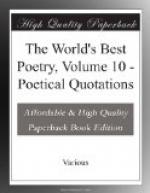In his own verse the poet still we find.
In his own page his memory lives enshrined.
As in their amber sweets the smothered
bees,—
As the fair cedar, fallen before the breeze,
Lies self-embalmed amidst the mouldering
trees.
Bryant’s Seventieth Birthday. O.W.
HOLMES.
There is a pleasure in poetic pains
Which only poets know.
The Timepiece: The Task, Bk. II.
W. COWPER.
While pensive poets painful vigils keep,
Sleepless themselves to give their readers
sleep.
The Dunciad. A. POPE.
Deem not the framing of a deathless lay
The pastime of a drowsy summer day.
But gather all thy powers,
And wreak them on the verse that thou
wouldst weave.
The Poet. W.C. BRYANT.
From his chaste Muse employed her heaven-taught
lyre
None but the noblest passions to inspire,
Not one immoral, one corrupted thought.
One line which, dying, he could wish to
blot.
Prologue to Thomson’s Coriolanus.
LORD LYTTELTON.
I can no more believe old Homer blind,
Than those who say the sun hath never
shined;
The age wherein he lived was dark, but
he
Could not want sight who taught the world
to see.
Progress of Learning. SIR J. DENHAM.
Read Homer once, and you can read no more,
For all books else appear so mean, so
poor;
Verse may seem prose; but still persist
to read,
And Homer will be all the books you need.
Essay on Poetry. SHEFFIELD, DUKE OF BUCKINGHAMSHIRE.
The poet in a golden clime was born,
With golden stars above;
Dowered with the hate of hate, the scorn
of scorn,
The love of love.
The Poet. A. TENNYSON.
Happy who in his verse can gently steer
From grave to light, from pleasant to
severe.
The Art of Poetry. J. DRYDEN.
But those that write in rhyme still make
The one verse for the other’s sake;
For one for sense, and one for rhyme,
I think ’s sufficient at one time.
Hudibras, Pt. II. DR. S. BUTLER.
For rhyme the rudder is of verses.
With which, like ships, they steer their
courses.
Hudibras, Pt. I. DR. S. BUTLER.
And he whose fustian ’s so sublimely
bad,
It is not poetry, but prose run mad.
Prologue to Satires. A. POPE.
I had rather be a kitten, and cry, mew,
Than one of these same metre ballad-mongers;
I had rather hear a brazen can stick turned,
Or a dry wheel grate on the axle-tree;
And that would set my teeth nothing on
edge,
Nothing so much as mincing poetry:
’T is like the forced gait of a
shuffling nag.
King Henry IV., Pt. I. Act iii. Sc.
1. SHAKESPEARE.
Poets, like painters, thus unskilled to
trace
The naked nature and the living grace,
With gold and jewels cover every part,
And hide with ornaments their want of
art.
True wit is nature to advantage dressed,
What oft was thought, but ne’er
so well expressed.
Essay on Criticism, Pt. II. A. POPE.




